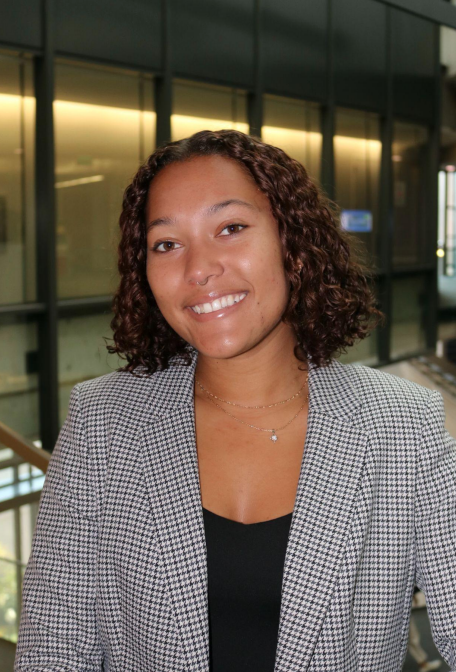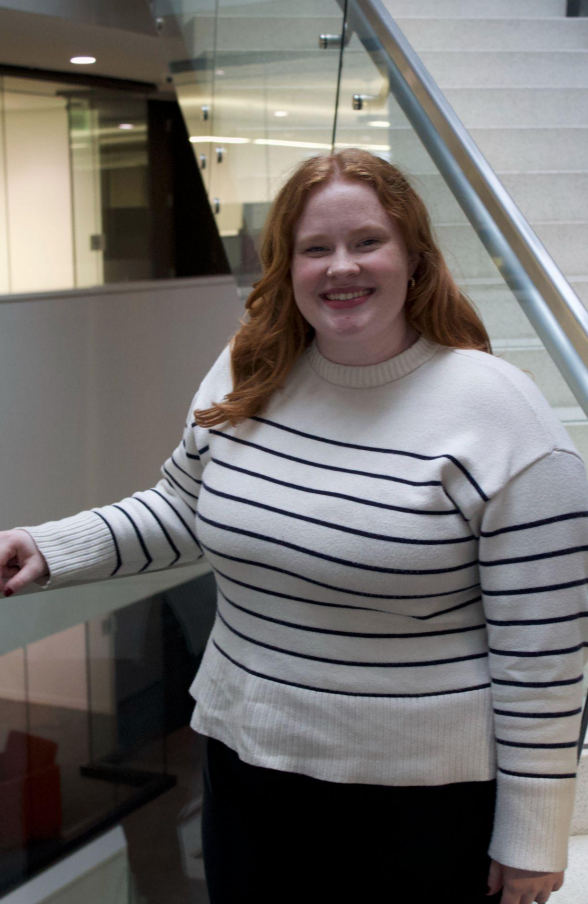2023-2024 Cohort
2023-2024 Cohort

Jen Farnsworth (she/her)
Jen is a second-year Master of Public Health student concentrating in Maternal and Child Health.

Carolyn Brown-Kaiser (she/her)
Carolyn is a second-year Master of Public Health student concentrating in Maternal and Child Health.

Catalina Desouza (she/her)
Catalina is a second-year Master of Public Health student concentrating in Maternal and Child Health.

Larkin O'Gorman (she/her)
Larkin is a second-year Master of Public Health student concentrating in Maternal and Child Health.

Rachael Bailey (she/her)
Rachael is a second-year Master of Public Health student concentrating in Maternal and Child Health.

Sydney Durrah (she/her)
Sydney is a second-year Master of Public Health student concentrating in Maternal and Child Health.

Cate Pribyl (she/her)
Cate is a second-year Master of Public Health student concentrating in Maternal and Child Health.

Rylea Luckfield (she/they)
Rylea is a second-year Master of Public Health student concentrating in Health Policy.

Clare Beymer (she/her)
Clare is a Master of Public Health and Physician Assistant student concentrating in Maternal and Child Health.

Alanna McGill (she/her)
Alanna is a Master of Public Health and Physician Assistant student concentrating in Maternal and Child Health.

Sierra Acker (she/her)
Sierra is a Master of Public Health and Physician Assistant student concentrating in Maternal and Child Health.

Katie Ghougasian (she/her)
Katie is a second-year Master of Public Health student concentrating in Health Policy.

Cassie Navalta (she/her)
Cassie is a second-year Master of Public Health student concentrating in Maternal and Child Health.

Akhilesh Anil Jakhete (he/him)
Akhilesh is a second-year Master of Public Health student concentrating in Epidemiology.

Trisha Maragathavel (she/her)
Trisha is a second-year Master of Public Health student concentrating in Epidemiology.

Hervinah Celestin (she/her)
Hervinah is a second-year Master of Public Health student concentrating in Maternal and Child Health.
LTP Retreat: March 2nd
The Leadership Training Program had their day long retreat on Saturday, March 2nd! Students had the chance to immerse themselves in activities such as creating vision boards, guest speaker discussions and a relaxing yoga class to connect with their fellow cohort members!



Member Blog Posts:
Read about each member's experience throughout their time in the Leadership Training Program!

Alanna McGill
Being a part of the Maternal and Child Health Leadership Training Program has provided me so much more than I expected. I applied to be a part of this program because of the role I knew I wanted to take on as a future physician assistant with a master’s degree in public health. It is often difficult to find leadership opportunities as a physician assistant and I wanted to ensure that I am equipped with the skills needed to be a good leader when given the opportunity. This program not only helped me develop and strengthen my leadership skills but also taught me how to create a space for myself to serve as a leader in any environment. I feel more confident in my communication skills, team building, and critical thinking.
One aspect of this program that I am most grateful for is the community of public health leaders that I was surrounded by. Each session I learned so much from my peers through discussion and personal stories. I felt so lucky to be in an environment with so many diverse and educated perspectives. Knowing that we all shared a passion for public health and maternal and child health was extremely empowering. One of my favorite days was during our 8-hour retreat where we got to spend time with everyone in the program having powerful discussions but also doing self-care like yoga and meditation together. Taking the time to reflect on ourselves as leaders and how to take care of ourselves and each other created an extremely supportive and meaningful experience.
I plan to use the skills that I have developed through this program as a future clinician and as a researcher. I hope to work in a women’s health clinic as a physician assistant and not only treat my patients but empower them to take control of their health and fully understand their conditions. Eventually I would like to use my clinical knowledge in combination with my public health degree to do program implementation and research in the women’s health field as well. Utilizing the leadership skills that I have gained through this program and the connections with other future public health leaders, I feel confident that I will be able to make a significant impact on the lives of my future patients and in my community.

Sydney Durrah
In the realm of public health, leadership is not just about making decisions; it's about fostering critical thinking, embracing diversity, and navigating complex challenges with empathy and expertise. As a graduate with a Master in Public Health (MPH), the journey towards becoming an effective leader in this field is both exhilarating and daunting. However, with the right training program equipped with a diverse curriculum encompassing critical facets of leadership, management, and social responsibility, the path becomes clearer, and the destination more attainable. I can confidently say that my journey through a Leadership Training Program (LTP) has equipped me with a robust set of skills and knowledge vital for success in the field. Covering a diverse range of subjects from critical thinking to burnout prevention, this curriculum has been instrumental in shaping my understanding of effective leadership in public health.
One of the foundational pillars of this training was critical thinking. In the dynamic landscape of public health, being able to analyze information, evaluate evidence, and make informed decisions is paramount. Through rigorous exercises and case studies, I honed my ability to think critically, ensuring that I can navigate complex issues and devise innovative solutions. Leadership management was another crucial aspect of the program. Learning how to inspire, motivate, and guide teams towards a shared vision is essential for driving impactful change in public health initiatives. By understanding different leadership styles and strategies, I am better equipped to lead diverse teams and foster collaboration across various stakeholders.
Effective communication is key when working with non-public health audiences, and this program emphasized the importance of written communication in conveying complex public health concepts. Whether drafting reports or crafting messaging for diverse communities, I developed the skills to communicate effectively and drive meaningful engagement. Diversity, equity, inclusion, and accessibility (DEIA) are essential principles that underpin effective public health practice. Through thoughtful discussions and experiential learning activities, I gained a deeper understanding of how to integrate DEIA principles into every aspect of my work, ensuring that my initiatives are inclusive and equitable. Structural racism is a pervasive issue that significantly impacts public health outcomes. This program delved into the root causes of structural racism and provided strategies for addressing inequities within healthcare systems. Armed with this knowledge, I am committed to advocating for policies and practices that promote health equity for all.
Team building and managing teams were focal points of the training, as effective teamwork is essential for achieving public health goals. By fostering a culture of trust, collaboration, and accountability, I learned how to harness the collective strengths of a team to drive impactful change. Burnout prevention is a critical consideration in the demanding field of public health. Through self-care strategies and stress management techniques, I learned how to prioritize my well-being while remaining resilient in the face of challenges. Negotiation and conflict resolution are essential skills for navigating the complexities of public health partnerships and collaborations. By mastering techniques for constructive dialogue and compromise, I am better equipped to navigate disagreements and find mutually beneficial solutions.
In conclusion, the leadership training program has equipped me with a multifaceted skill set and knowledge base that will serve me well as a graduate with a Master's in Public Health.

Larkin O'Gorman
I feel incredibly fortunate to have had the opportunity to participate in the MCH Leadership Training Program. This program has equipped me with the skills to confidently venture into future leadership roles and collaborate with other leaders as I continue my work in the field of public health.
Throughout the program, I had the opportunity to learn from a variety of leaders with experience and expertise in public health. Some of the most significant takeaways I learned from our speakers and discussions include leading with empathy, utilizing critical thinking skills, and prioritizing self-care.
A common theme among many of our speakers and conversations was the role of empathy in leadership. Leading with empathy builds trust, improves communication, and increases engagement with those around you. In leadership positions, my ability to approach situations with empathy will ensure I support and meet the needs of those I work with, fostering a more efficient and meaningful workspace.
Similarly, many of our conversations revolved around a leader's ability to utilize critical thinking as a tool. Equipping myself with critical thinking skills will enable me to navigate challenging problems and situations by analyzing information deeply, questioning assumptions, and fostering innovative thinking. This skill will also empower those around me to think more deeply and creatively.
The third valuable lesson I will carry with me from my time in the Leadership Training Program is the importance of self-care. As a leader, I recognize that others will look to me for support. However, if I neglect self-care, I will not be able to lead effectively. Therefore, prioritizing self-care will be essential for me as I continue to lead.
One of the most meaningful aspects of this experience was the conversations I had with my peers. The opportunity to create a space to discuss our opinions, views, and concerns about being public health leaders gives me confidence in the individuals I will collaborate with in future leadership roles.
While the Leadership Training Program is just a stepping stone on my journey to growing as a public health leader, I am confident that the tools and skills I have developed will contribute to my success as I progress in my career
Testimonials from LTP Members
What do you hope to gain from the Leadership Training Program?
"I think it's a critical time to reevaluate what leadership means in public health. I wanted to be part of a cohort that had similar interests in creating change and being in a safe space to discuss and come up with tangible ways I could improve."
Jen Farnsworth
(She/her)
"I was drawn to the Leadership Training Program because it provides the opportunity to acquire knowledge and hone competencies essential for making a substantive impact and championing health equity within a leadership role in the Maternal and Child Health field. I look forward to learning from the Maternal and Child Health faculty facilitating our workshops and my fellow Leadership Training Program cohort members."
Carolyn Brown-Kaiser
(She/her)
"As a PA/MPH student in MCH, I am working toward a career where I can cohesively integrate my public health knowledge into clinical practice as a physician assistant. I joined the LTP because I believe that leadership is a fundamental skill for practitioners of public health and healthcare alike because it equips the individual with the tools to unite and guide people."
Clare Beymer
(She/her)
"I feel like the MCH LTP offers the perfect hands-on approach to collaboration and provides the opportunity to strengthen my communication, teamwork, and analytical skills with not only esteemed faculty, but also my fellow students."
Cate Pribyl
(She/her)






